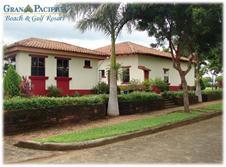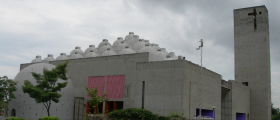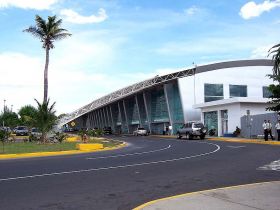What are the construction standards in Managua, Nicaragua?
Kent Payne
Construction standards in Nicaragua may be a bit dicey for a couple of reasons. First and most importantly, there is no “standard”  as such. Every type of construction imaginable can be found in Nicaragua, from tin buildings with metal roofs to huge condominium projects of 6 to 8 stories selling currently for up to $1,600 / square meter (about $150 / square foot.
as such. Every type of construction imaginable can be found in Nicaragua, from tin buildings with metal roofs to huge condominium projects of 6 to 8 stories selling currently for up to $1,600 / square meter (about $150 / square foot.
 as such. Every type of construction imaginable can be found in Nicaragua, from tin buildings with metal roofs to huge condominium projects of 6 to 8 stories selling currently for up to $1,600 / square meter (about $150 / square foot.
as such. Every type of construction imaginable can be found in Nicaragua, from tin buildings with metal roofs to huge condominium projects of 6 to 8 stories selling currently for up to $1,600 / square meter (about $150 / square foot. When looking for someone to build, be sure to do a few simple things....
Construction standards in Nicaragua may be a bit dicey for a couple of reasons. First and most importantly, there is no “standard”  as such. Every type of construction imaginable can be found in Nicaragua, from tin buildings with metal roofs to huge condominium projects of 6 to 8 stories selling currently for up to $1,600 / square meter (about $150 / square foot.
as such. Every type of construction imaginable can be found in Nicaragua, from tin buildings with metal roofs to huge condominium projects of 6 to 8 stories selling currently for up to $1,600 / square meter (about $150 / square foot.
 as such. Every type of construction imaginable can be found in Nicaragua, from tin buildings with metal roofs to huge condominium projects of 6 to 8 stories selling currently for up to $1,600 / square meter (about $150 / square foot.
as such. Every type of construction imaginable can be found in Nicaragua, from tin buildings with metal roofs to huge condominium projects of 6 to 8 stories selling currently for up to $1,600 / square meter (about $150 / square foot. When looking for someone to build, be sure to do a few simple things. Check out what they’ve built before and speak to previous clients. But a builder is going to give only great referrals, so you need to do a little investigation on your own. Look at the fit and finishes on one of the homes, especially under the cabinets in the kitchen and bathrooms. It is not unusual to find a builder that has a hot and cold faucet in a kitchen, but the feed line under the cabinet has only cold water in and a ‘T” that carries water from the same line to both hot and cold.
Some larger developments may insist on the same builder, so I’d check his building methodology with a third party. There are US trained home inspection services appearing all over Nicaragua, and they’ll assist in double checking for the correct size steel in construction (if rebar steel is required), correct concrete density (psi), and other necessary inspections.
In the States and Canada, the municipal government is paid by the builder to come out and inspect: foundation, steel/reinforcement, framing, pluming rough in, electrical rough in, plumbing final, and electrical final just to mention the basics. In Nicaragua NONE, and I repeat NONE of these are mandated. Yes, there is a permit paid to the local municipality which alerts them to put the home onto the tax records for later (when finished and assessed). So you absolutely must have a builder who is willing to give you inspection by third party, absolute pricing (so you don’t get started and then the meter starts running amuck), and specific performance (finish on or before when, or builder pays a penalty). If you neglect any of these, you stand a chance of having a home incomplete after a long period of time, or one that is substandard to what you might expect.
Remember, especially close to the beach areas, that many of the workers have never seen some of the home styles they are constructing, much less lived in one. So the experience and quality of the builder’s direction is paramount for you receiving all that you’ll be paying for.
Posted February 1, 2014
Frank Martínez
 The construction standards here in Managua are the same as in San Francisco, California. Our construction code was almost a copied from the construction code of San Francisco; it was just translated in Spanish. This should give you a fairly good idea of how high the construction standards are in Managua.
The construction standards here in Managua are the same as in San Francisco, California. Our construction code was almost a copied from the construction code of San Francisco; it was just translated in Spanish. This should give you a fairly good idea of how high the construction standards are in Managua. Everything from laying the foundation, to using cement and iron in building has been compared to the construction standards of San Francisco,...
 The construction standards here in Managua are the same as in San Francisco, California. Our construction code was almost a copied from the construction code of San Francisco; it was just translated in Spanish. This should give you a fairly good idea of how high the construction standards are in Managua.
The construction standards here in Managua are the same as in San Francisco, California. Our construction code was almost a copied from the construction code of San Francisco; it was just translated in Spanish. This should give you a fairly good idea of how high the construction standards are in Managua. Everything from laying the foundation, to using cement and iron in building has been compared to the construction standards of San Francisco, California because we are in a very high-risk region in the Pacific for earthquakes. We are on the San Andreas Fault, which crosses all of Latin America. The San Andreas Fault crosses Costa Rica, Nicaragua, Mexico, and San Francisco, so the earth moves a lot here. Therefore, our construction standards for new buildings here in Managua are very high.
 In 1972, we had a major earthquake that almost brought down 80% of all the houses in Managua because they were not constructed properly. After 1972, they created this new construction code and put it in place. From then on up to that date, we have well-built 40-year old houses that are seismic proof because they were built based on that new construction code.
In 1972, we had a major earthquake that almost brought down 80% of all the houses in Managua because they were not constructed properly. After 1972, they created this new construction code and put it in place. From then on up to that date, we have well-built 40-year old houses that are seismic proof because they were built based on that new construction code. My parents bought a new house 40 years ago and it still stands today even after earthquakes rocked the city of Managua. We had a major earthquake in April, which ranked 7.2 on the scale, but it didn’t even cause a crack on the walls of our house. Those 40-year old houses in Managua are still up because they were built as per high construction standards.
Posted December 21, 2014
Immanuel Zerger - Solentiname Tours - Discover Nicaragua
 It is best if you have a plan of the catastro (land registry) of the property where you are building. You should have an architectural design and building plan that is signed by the authorized municipality. There is a municipal office that authorizes all construction plans. When you have those, then you are secure that the lot your property is built on and the structure built on it are both legal and meet the construction requirements.
It is best if you have a plan of the catastro (land registry) of the property where you are building. You should have an architectural design and building plan that is signed by the authorized municipality. There is a municipal office that authorizes all construction plans. When you have those, then you are secure that the lot your property is built on and the structure built on it are both legal and meet the construction requirements. If you are building...
 It is best if you have a plan of the catastro (land registry) of the property where you are building. You should have an architectural design and building plan that is signed by the authorized municipality. There is a municipal office that authorizes all construction plans. When you have those, then you are secure that the lot your property is built on and the structure built on it are both legal and meet the construction requirements.
It is best if you have a plan of the catastro (land registry) of the property where you are building. You should have an architectural design and building plan that is signed by the authorized municipality. There is a municipal office that authorizes all construction plans. When you have those, then you are secure that the lot your property is built on and the structure built on it are both legal and meet the construction requirements. If you are building a house, you have to have architectural drawings and a construction plan. You have to submit those to the municipal office that authorizes all construction plans. The municipal office has to authorize the plan before you can start building. The plan needs to have certain seismic considerations, since you have to plan for earthquakes here in Nicaragua. Building seismic-proof construction is obligatory in Managua. They will also check to make certain that what you are building is what they authorized.
If you are buying a house that is already built, it is advisable to get an evaluation done by an architect or an engineer to be sure that construction standards are met. The quality of houses and other buildings in Managua varies, so it is better to have an evaluation done before buying.
Posted January 30, 2015


